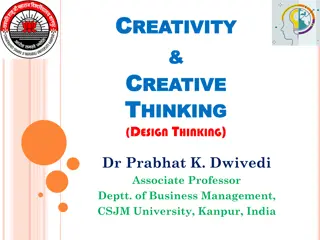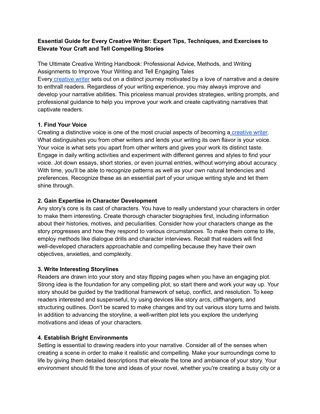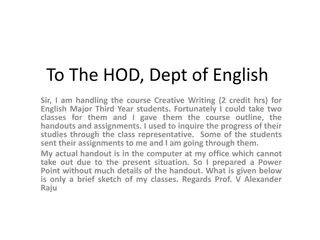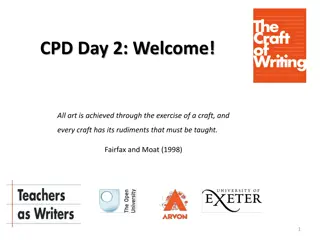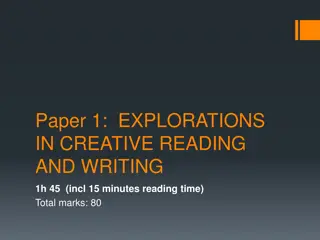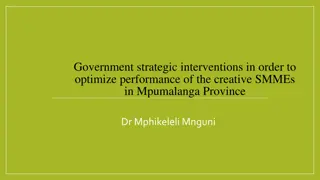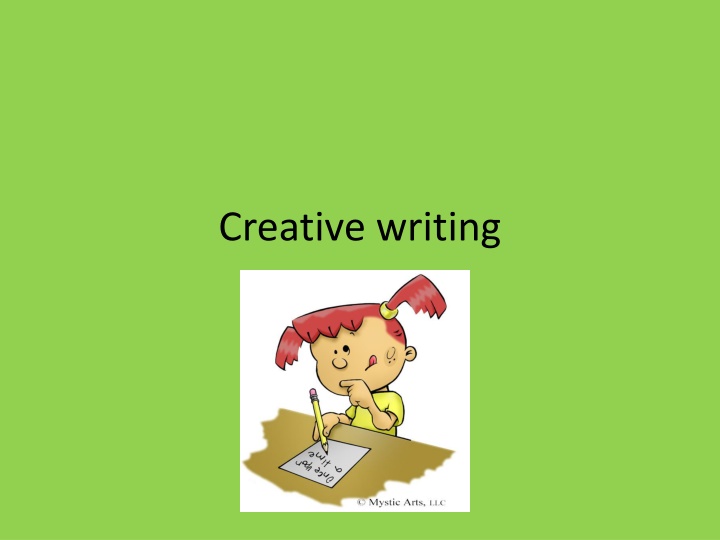
Crafting Compelling Fiction: Essential Tips for Writers
Dive into the art of creative writing with this guide that emphasizes the importance of believable characters, detailed settings, and engaging plots. Learn how to develop characters, create immersive settings, and structure your story with a focus on a life-changing event. Explore key steps before, during, and after writing to enhance your storytelling skills and captivate your readers.
Download Presentation

Please find below an Image/Link to download the presentation.
The content on the website is provided AS IS for your information and personal use only. It may not be sold, licensed, or shared on other websites without obtaining consent from the author. If you encounter any issues during the download, it is possible that the publisher has removed the file from their server.
You are allowed to download the files provided on this website for personal or commercial use, subject to the condition that they are used lawfully. All files are the property of their respective owners.
The content on the website is provided AS IS for your information and personal use only. It may not be sold, licensed, or shared on other websites without obtaining consent from the author.
E N D
Presentation Transcript
A good story cannot exist without believable fictional characters, a detailed setting and, of course, a plot. Throughout your story you need to try and show how each person ticks . Why are they where they are? What is their relationship? What is the problem between them? In all cases you will be asked to describe people and places by showing what they are like, rather than telling us outright. Also, remember that a short story deals with ONE life changing event.
Before writing Make sure you have a good sense of who the characters are and have a good idea of how they will react to events. Make sure you know your characters emotions and back story. It is very unlikely that Macbeth will be utterly distressed at having ordered the assassination of Banquo; for him, holding on to his kingship at all cost is more important than friendship. Make sure you know exactly when and where the events of your story occur. In a school you will meet different people from a prison or a football pitch; try and think about sights, sounds and smells as well as the kinds of interactions that might take place in your chosen location at your chosen point in time. Think carefully about the point of view and narrative stance. A 1stperson narrative allows you to show one persons ideas and feelings but it is very limited and often biased; in addition there is the problem of having to make sure you don t start too many sentences with I .
During Writing Always write either in the 1stperson or the third person. You must stick to one point of view. If your character speaks with a specific accent or uses old- fashioned words, bear this in mind. A character from the Scotland will use specific Scots expressions and vocabulary. Somebody working closely with doctors might use medical jargon. This will make your characters more believable. Don t forget to punctuate properly and use paragraphs. In most cases, the character you are pretending to be will know how to do this.
After writing Make a point of proofreading your work for spelling, punctuation, paragraphing, tenses and incomplete or confusing sentences.
Plot Beginning Middle End
Plot To ensure it is interesting there should be a problem/ event that happens to your character Your character should sort out this problem/event to have either a good or a bad end
Plot planning 3. Opening 1. Problem 2. Resolution/ Ending


